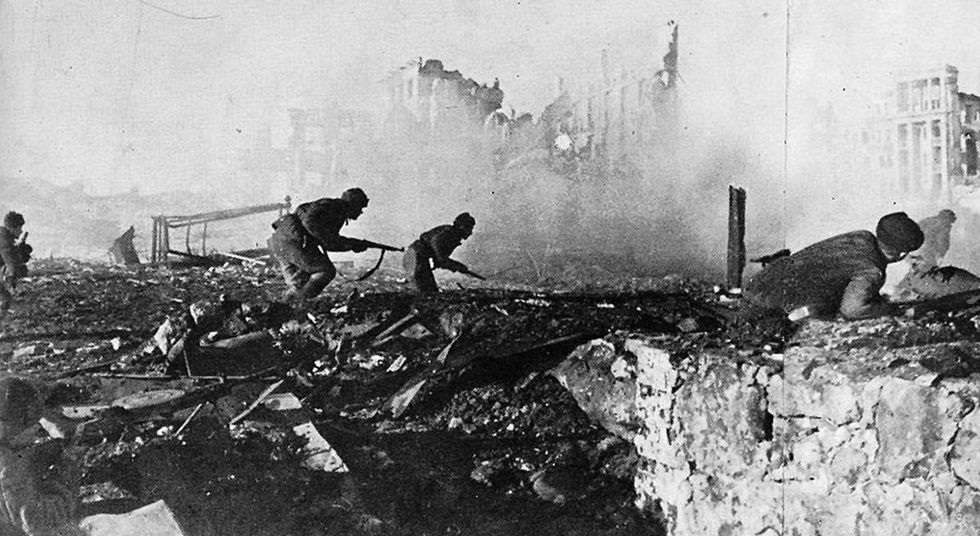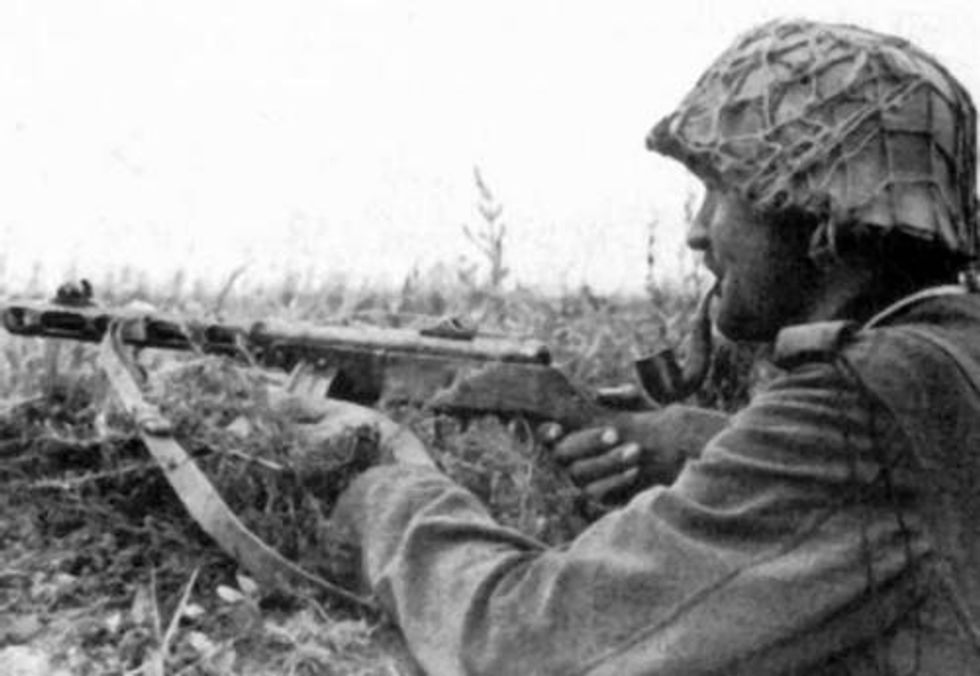Those are the words of Soviet foreign minister Vyacheslav Molotov when German forces began their invasion of the Soviet Union.
Imagine the two most screwed-up dictators of Europe going at it. Wait, that's exactly what happened on this day, when Adolf Hitler decided to launch the German invasion of the Soviet Union, the country ruled by his arch nemesis Joseph Stalin, perhaps his worst idea ever yet.
Firstly, I understand that not many folks here on the Odyssey are huge military history freaks like I am, so I'm going to cut this post of all the military jargon, which believe it or not....coming from a history freak like me, isn't an easy thing!
So anyways...back on the subject....
how? Why?
Well it's simple, the Cold War was nothing new, there already "was" a "cold war" in Europe prior to "the Cold War". Yes, the Soviet Union was involved, but it wasn't a "Capitalist vs. Communist" thing, it was a "Fascist vs. Communist" thing.
Both Nazi Germany and Soviet Russia were going on endless conquests that had the world's leaders quivering in fear. Germany was busy conquering and spreading their influence in Western and Central Europe. The Soviet Union was busy conquering and spreading their influence in Eastern Europe and Central Asia.
Just like NATO and the Soviet Union's proxy wars fought during the Cold War of 1946-1992, Germany and the Soviet Union also funded proxy wars, particularly in Spain. A "proxy war" just y'all know, is a war indirectly fought between two powers, using puppet states and groups against each other.
In this case, Germany funded the Spanish Fascists and the Soviet Union funded and supported the Spanish Communists in the Spanish Civil War. This was also done in Finland, in which Germany (then the German Empire) funded right-wing paramilitary groups against Soviet-supported communist paramilitary in the Finnish Civil War.
The Soviet Union's puppet groups lost both civil wars. But they were still able to retain much of their influence in Central Asia.
Looking at the bios of Stalin and Hitler, and their rise to powers - it is pretty evident that Stalin was worst of the two dictators, as Stalin killed more than twice the number of people Hitler killed.
Unlike Hitler, who was respected in Germany, probably for improving its economy and bringing it to power, Stalin was hated in the Soviet Union, for destroying its economy and its military leadership. On the brighter side, the Soviet Union was one of the leading industrial powers of the world.
However - yes, both leaders were brutal, who turned both of their countries into police states, with Germany utilizing the Gestapo and the Schutzstaffel (known commonly as the SS) to carry out atrocities against non-Aryans, and the Soviet Union utilizing the NKVD to carry out atrocities against...well...just anyone Stalin didn't like.
By 1939, the two police-state powers met in Poland, and partitioned the land between a German-controlled western Poland and a Soviet-controlled eastern Poland. The two nations afterwards, signed the German-Soviet Nonaggression Pact, or the Molotov-Ribbentrop Pact (named after Vyacheslav Molotov and his German counterpart Joachim von Ribbentrop).
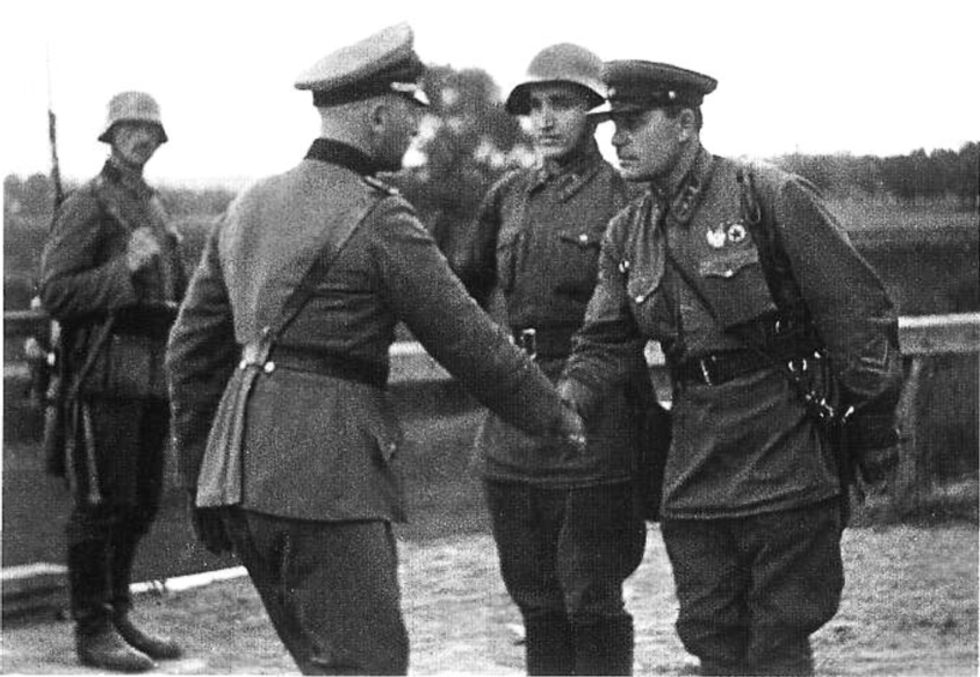
after German and the Soviet Union's invasion of Poland
The pact ended up designating Finland and Estonia under the Soviet sphere of influence, which led to the Soviet-Finnish Winter War, that ended in a very, very costly Soviet military victory.
However, Hitler was never planning to "befriend" his Soviet counterpart Joseph Stalin, as was Joseph Stalin towards Hitler. This is because Hitler viewed all communists, and non-Aryans - including the Slavic peoples of Russia, Poland, Ukraine and Belarus and the Asiatic peoples of Siberia and Central Asia as sub-humans, that needed to be conquered and subdued, and if not subdued, used as as slave labor as the Germans occupied their land for lebensraum, or living space.
Stalin on the other hand, not taking too kindly for the communists losing the German Civil War, wanted to conquer Berlin and wipe fascism off the face of the Earth.
Despite multiple warnings from German soldiers from across German-occupied Poland to their Soviet counterparts in eastern Poland, Stalin refused to listen, and had the German soldiers killed.
And today, in 1941, German troops finally began their invasion of the Soviet Union, first by driving the Soviet forces out of Poland, putting all of Poland under German and penetrating deep into Russia.
Despite what we see in video games and movies of the Soviets being an invisible juggernaut that destroyed the German invasion, the reality was that the Germans were VERY successful in the invasion at first, capturing more than 3 million Soviet troops and penetrating deep into Russian territory. Many of those Soviet prisoners were victims of the Holocaust.
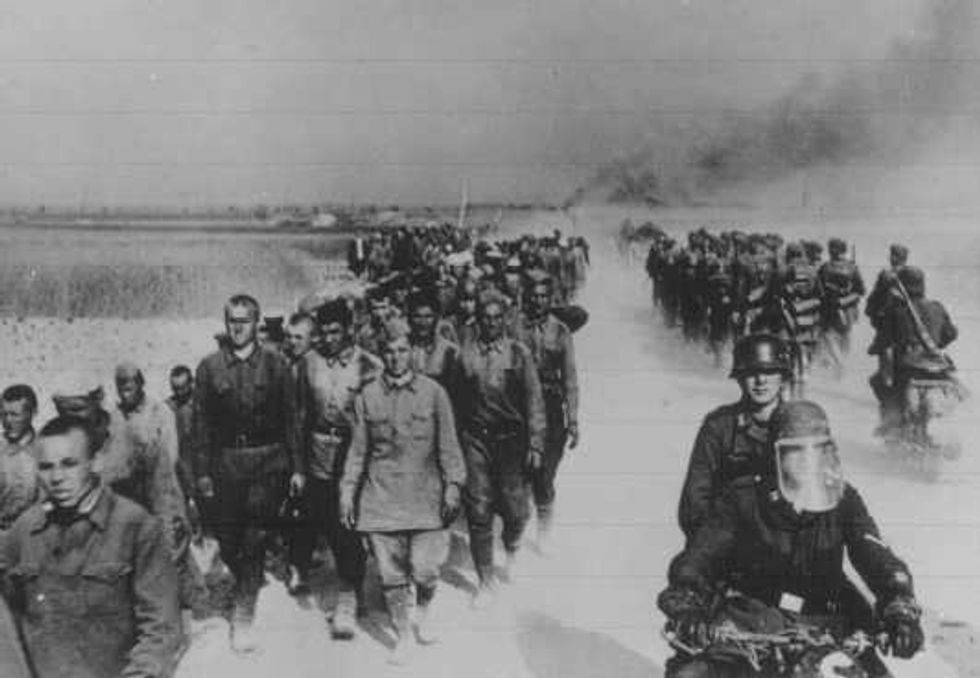
POWs into captivity
Wait...what? Soviet soldiers surrendered to the Germans?
Yes they did. This is because the Red Army (the name for the ground forces of the Soviet Union at the time) was in shambles, having gone through a horrific purge under Joseph Stalin's brutal regime (the purges destroyed much of the Red Army's competent leaders and replaced with mediocre leaders).
This left the Red Army in a very disorganized state. If you saw that last picture, you couldn't even tell those prisoners were soldiers.
Despite having more than twice the number of soldiers than the Wehrmacht (the official name for the armed forces of Germany at the time), the Red Army lacked the proper equipment, motivation and leadership against the well-trained and technologically-advanced Wehrmacht.
The Germans captured much of Ukraine, Belarus, Lithuania and Latvia and it certainly did not make the Soviet situation any better that Germany had allies and co-belligerents in Finland, Romania and Hungary readily helping them on the front lines, while the Soviet Union's allies were on the other side of the globe fighting the Wehrmacht on another front.
Croatia and Slovakia, both Fascist puppet states of Germany also helped in their invasion of the Soviet Union, as well as Italy and Spain. So that's eight countries fighting the Soviet Union.
In addition, Finland, whom the Soviets fought a very costly war against years prior from 1939 to 1940, had some unfinished business, not having forgotten about losing East Karelia. Finland used a co-belligerence with Germany to re-conquer East Karelia from the Soviets.
With Finland attacking from the north, Germany from the west, Romania from the south, and a possible Japanese attack from the far east - a "fall of the Roman Empire"-type situation seemed imminent for the Soviet Union.
To add insult to injury...the inhabitants of those territories that the Germans conquered, often welcomed the Germans as liberators, because of their strong hatred of Stalin (only to brutally realize that Hitler's regime was no better....).
After having suffered so many casualties, the Red Army was finally outnumbered to around around 2 million soldiers up against around 3 million Germans.
It's no wonder why Stalin went through a nervous mental breakdown, the lad felt betrayed by Hitler, everyone was attacking his nation, he was already evacuating government leadership, personnel and property from Moscow, expecting the city to fall.
So what happened? How did the Soviets reverse the invasion?
Well firstly, once the Germans neared Moscow, the invasion was no longer a cake walk. The brutal Russian Winter gave the German soldiers frostbite, and the muddy Russian Summers made the German equipment malfunction and caked in mud.
Despite nearing Moscow to the point where the Germans could see the skyline of the Onion Domes in the distance, the Germans never actually set foot in the city.
This is because it's simple: the Russians never let them lay a foot on Moscow, despite the fact that the Soviets only had some 90,000 men to defend Moscow against 100Ks of German soldiers.
How? Well, because Joseph Stalin learned, that Japan - an ally of Germany, was not planning to attack the Soviet Union from the east (instead, Japan pushed for Oceania and Southeast Asia).
Therefore, Stalin was able to pull in fresh reinforcements from Siberia, originally to be used to fight a possible Japanese invasion - approximately 1 million soldiers, to combat the German invasion.
The soldiers from Siberia war far-superior in training and skills than their European counterparts, especially fighting in winter conditions.
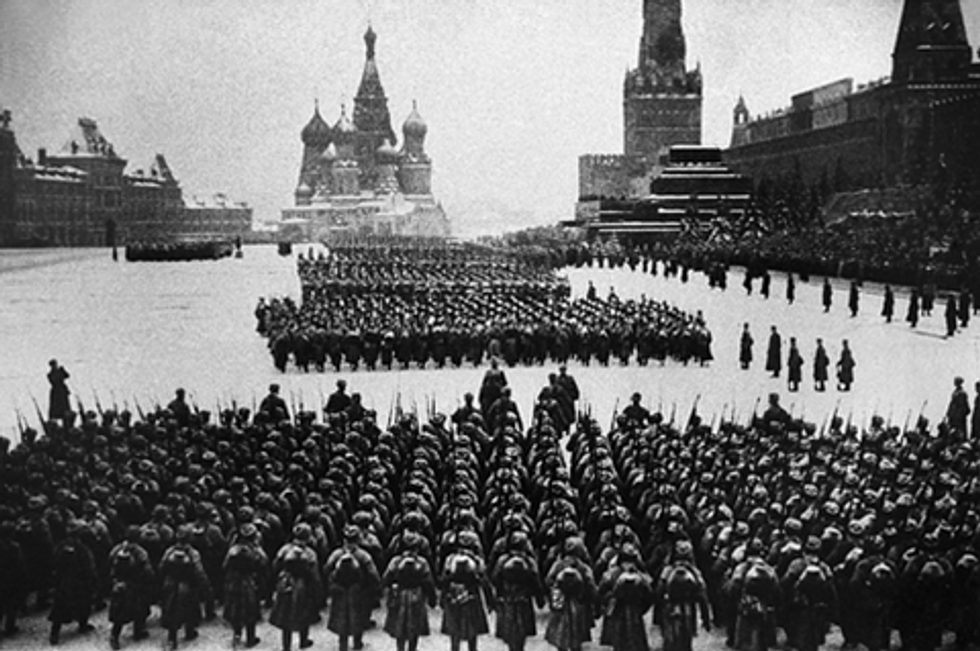
from the Germans, 1941
In addition, the Red Army could care less about losing millions of men in battle, so long as they died fighting. Stalin did not take too kindly to Soviets that surrendered, and would later punish them by making them serve in penal battalions, or just...shooting them.
 German soldiers surrender to the Soviets, near Moscow 1942
German soldiers surrender to the Soviets, near Moscow 1942
Hitler also made a couple bogus decisions in of himself - ordering the already battered German troops, who had endured constant attacks by desperate Soviet defenders, to keep pushing into the Soviet capital. '
The renewed Soviet defensive effort pushed the German invaders back to Rzhev, 150 miles west of Moscow. The Battle of Moscow therefore, ended up in a victory for the Red Army. However, the bloody attrition between two of the world's most feared armies continued in Rzhev to no avail.
With the Germans facing oil shortages, Hitler began to target the oil fields of the Caucasus, particularly Baku in Azerbaijan. Despite once-more, defeating most of the Soviet forces in their way, the vast land and vast number of Soviet soldiers proved to be too much, and the Germans never ended up achieving their ultimate goal. The Soviets also destroyed anything that the Germans could possibly use, setting oil rigs on fire and moving all of the production east.
One thing the Germans could never figure out, as no matter how many causalities they inflicted, no matter how much they thought "it was over" or "they must be giving up by now", more and more Soviet soldiers just kept on attacking from all ends.
Stalin's message to Hitler: if you want to conquer Russia, we'll make you work, for every bit of it.
Contrary to what the Germans thought they did, their enemy just kept growing and growing and growing, despite the Germans having the advantage in terms of readily-available allies and technology.
By 1943, the Soviet armaments began to outproduce, outpace and dominate its German counterpart and by the time the war progressed, the Soviets began to outgun the Germans in small-arms battles, nobody can forget the PPSh-41 submachine gun, influenced by the Finns' Suomi KP/-31, which made the Germans either
a). scared....or.....
b). jealous.
The Germans' own sub machine gun, the MP-40 was no match for the monstrous firepower that the PPSh-41 provided for the Soviets.
Not to mention, that the MP-40 was only issued to paratroopers and officers, while the PPSh-41 was mass-produced, and almost entire units would be armed with PPSh-41s.
When the Germans (particularly the German 6th Army) reached the city of Stalingrad (lit. Russian for "Stalin City") on the banks of the Volga River, they were met with brutal house-to-house and street-to-street fighting.
The Battle of Stalingrad would be - the Eastern Front's single most deadliest and bloodiest battle. Both the Germans and Soviets refused to surrender, with the Germans pulling in reinforcements from the west and the Soviets pulling in reinforcements from east of the Volga River.
By this point,
a). Stalin's "no surrender" policy had come into full force, and Red Army troops who retreated in fear were shot as they were seen as cowards and traitors. By this point, Soviet soldiers simply had two choices: die by German bullets or by Soviet bullets.
b). The Germans were losing their will and the actual means to fight, day by day, their reinforcements from the west were getting very limited, the Soviets on the other had had the luxury of hoarding in fresh reinforcements from the east, of soldiers who were prohibited from retreating....oh yeah...and heavily armed.
Stalingrad also had sniper resistance on their side, and their now-fully operational armaments production enabled them to produce more and more T-34 tanks, which were far superior to every German tank in the battlefield.
After the Soviets eliminated the threat coming from Germany's Romanian and Hungarian allies (which were used to protect the 6th Army's weaker flanks), coupled in with Hitler's refusal to allow the Germans to retreat, the equally stubborn Soviets ended up sealing the deal with a victory over the depleted German forces in Stalingrad in 1943 when the 6th Army finally surrendered.
The victory in Stalingrad would, begin the end of Hitler's conquest of the Soviet Union. The Soviets continued to push the Germans east. While the Germans were able to pull off one last victory in Ukrainian city of Kharkov, their attempted invasion of the Kursk salient would result in yet - another attrition battle - in which they were met with more than 4 million Red Army soldiers, accompanied with more than 7,000 Soviet tanks to face off against theirs of 2 million troops and more than 3,000 tanks.
This battle would become World War II's biggest collision between armored forces.
With the decisive Red Army victory in the Battle of Kursk, the Germans would never attempt another counteroffensive, and assumed a defensive role for the rest of the war. The Red Army pushed the Germans all the way back, into their capital in 1944, as Stalin had dreamed of in 1942, to seal the victory of the Russian Motherland over the Fascists.
Other notable points of the war included the use of captured weapons. Germany was notorious for using captured Soviet weapons and using them against their Russian creators.
A German soldier using a captured Soviet PPSh-41
However when the Red Army turned the tides, it was their turn, and many soldiers used captured German equipment.
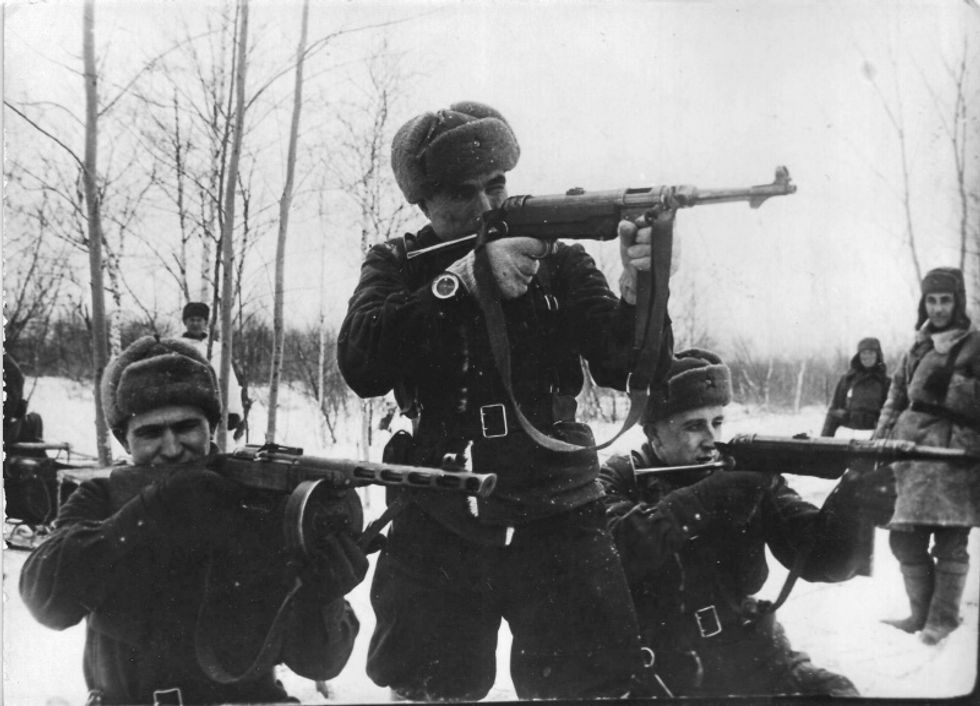
and right, are using captured German MP-40s
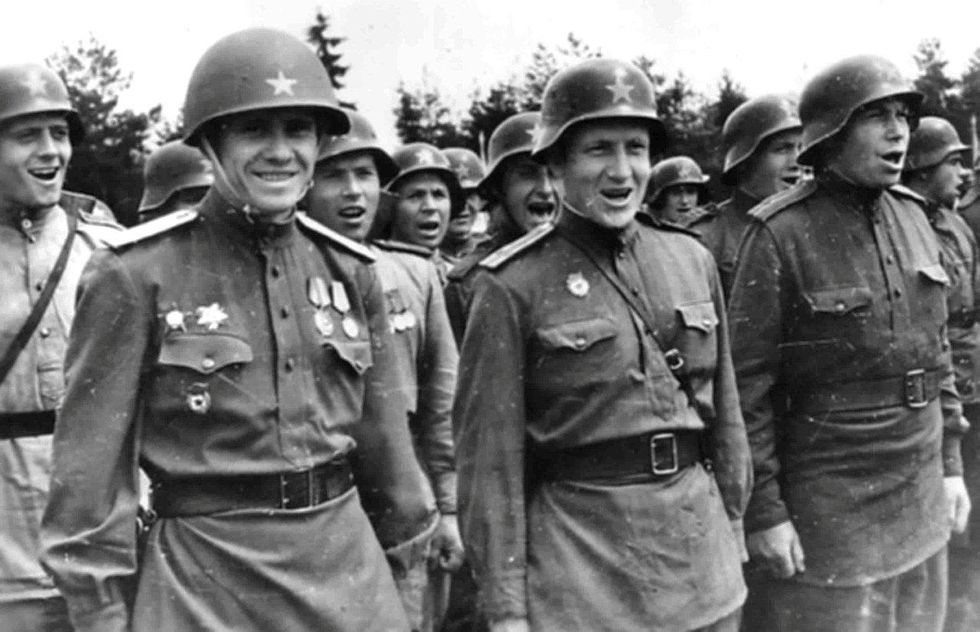
The Soviets re-issued captured German weapons to paramilitary groups fighting the invasion.
At the end of the war, the Soviet Union had so much captured German equipment, that the Kremlin decided to store and stockpile 'em all, ever in case a major war ever came on their soil again.
The Russian government has slowly been selling and getting rid of some of these German weapons, where American gun enthusiasts and collectors often purchase them.
Also, if there's anyone to give credit to: it's the Finns. If you research the Winter War, fought between Finland and the Soviet Union between 1939 and 1940 you'll find that the Finnish soldiers are using equipment, very similar to the ones that the Soviets used (such as the hat, ski attire and the 71 drum mag-equipped submachine gun). This is because the Soviets adopted many of their military tactics from the Finns.

